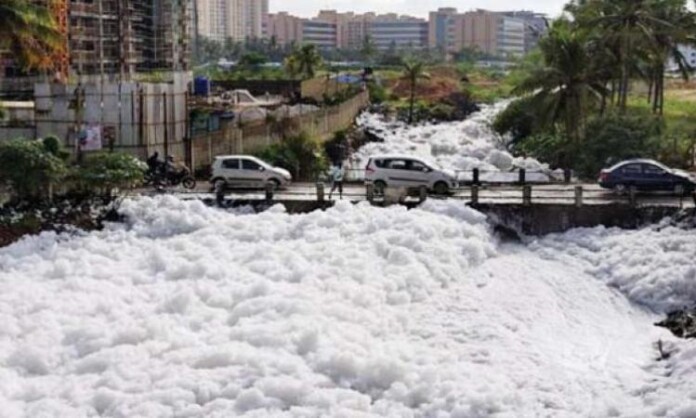India’s lax approach to water pollution is an open invitation to the next pandemic, warns Mridula Ramesh, water champion, author, climate activist, entrepreneur and an academic.
Why are we this way? How political expediency has made water reforms the slowest to address the dire need for cleaner water; should we wait patiently for the state to solve our water problems or should we encourage decentralized, local solutions: Where do we look for inspiration? Interestingly, many answers to the above questions are in Mridula’s new book Watershed: How We Destroyed India’s Water and How We Can Save It.
Excerpts of Mridula’s chat with Benedict Paramanand, Editor of SustainabilityNext and Founder of Greenlitfest during the 5th GLF Green Dialogues on World Water Day, 22 March, 2022.
- The next pandemic can be lurking in our dirty lakes, open drains and polluted rivers. When we have dirty water all around us, don’t be surprised if millions of us are wiped out by a water pandemic just the way Corona pandemic did in the last two years.
- We should not wait for policies to get us out of this mess. The recent Farm Laws saga has shown clearly that water reforms are not electorally attractive or salient for building resilience. That’s why my focus in the book is on how to build decentralized mechanisms.
- It’s surprising that even when water is the lead actress of the climate change drama carbon gets all the attention. Today, we have already crossed the climate threshold and water is the key element in it. That’s why I wrote this book.
- We need to make climate change conversation accessible. It is still seen as an elite topic. When I became part of climate conversations five years ago everyone was talking only about carbon. No one spoke about water. For India, water is very important given its traditions and the nature of its uneven distribution across the country.
- How can we prevent Green Revolution turning into black? I don’t believe in big reform push. What can work is an informal push by putting together a partnership of farmers, NGOs, start-ups, funding agencies etc. That’s what a start-up I’m part of is doing right now. We are working with 3,000 farmers in Punjab and are using disruptive technologies and business models.
- The change has to begin with every Indian showing respect to farmers in the Punjab-Haryana belt. When we were going around with begging bowls for wheat in the 1960s and 1970s, it is they who made the green revolution possible and have given India the food security it has today. We owe farmers a debt of gratitude.
- There is no one silver bullet for solving India’s water problems. We have not leveraged our start-ups well enough. the ones who are beginning to do well are using new-age technologies like sensors, internet of things, artificial intelligence and big data. They need all the support and incentives to scale. In fact, they are the vaccination of hope for India.
- Don’t wait for heroes to save us. This is both depressing and also enormously empowering. If we develop the attitude that water is my problem and I will be part of the solution, change will happen and this will have a ripple effect. The I here can be individuals, businesses, panchayats, wards, blocks etc.
- The Waterman of India, Rajendra Singh, has revived 12 rivers. His example shows that we don’t need outside ideas to drive change. You go there, figure out what works, and then go on to solve local problems. The community approach to addressing our water issues work because the stickiness factor is very high.
- Water is a positive force multiplier. Easier access to water can influence a whole lot of other factors. In the villages Rajendra Singh worked the marriage age of girls went up from 18 years to 23 years. Girls started going back to schools and boys were getting brides to come to their village because they had water.
- How do you make your book accessible? Teaching helps. I teach climate change at the Great Lakes Institute in Chennai. Also, getting non-science readers to review the manuscript helps.
Water is an unspoken foundation of our lives. It deserves more respect than we currently give. For a start, pay for water. It doesn’t come cheap.
a
Support Green Journalism
Dear Readers,
Since March 2013, SustainabilityNext (SN) has been educating and exciting thousands of entrepreneurs, executives and graduate students about the power of Sustainability in influencing our future. It’s purpose is to inspire and provoke Indians to move swiftly from awareness to belief to ACTION.
As of December 2021, SN is India’s most read digital magazine on the business of sustainability. It has been covering Green Business, Green Products, Social Entrepreneurship, Green Literature, Green Technology, among others. A youth section was added in 2021.
SN launched India’s first Green Literature Festival (www.greenlitfest.com) in June 2021 to offer a robust platform for readers and writers to hold meaningful conversations.
For SN to grow and stay relevant it needs to transition from a grant and self-funded model to a community-funded and/or institution/corporate-funded model.
Looking forward to your timely and generous support.
Why Support SN – https://sustainabilitynext.in/support/
Subscriber
Supporter
Benefactor
Sponsor
All supporters get two-year subscription to SN. You can Gift Subscription to your colleagues/friends/family.
For sponsorships and advertising please contact
Benedict Paramanand
Publisher & Editor
benedict99@gmail.com
a










